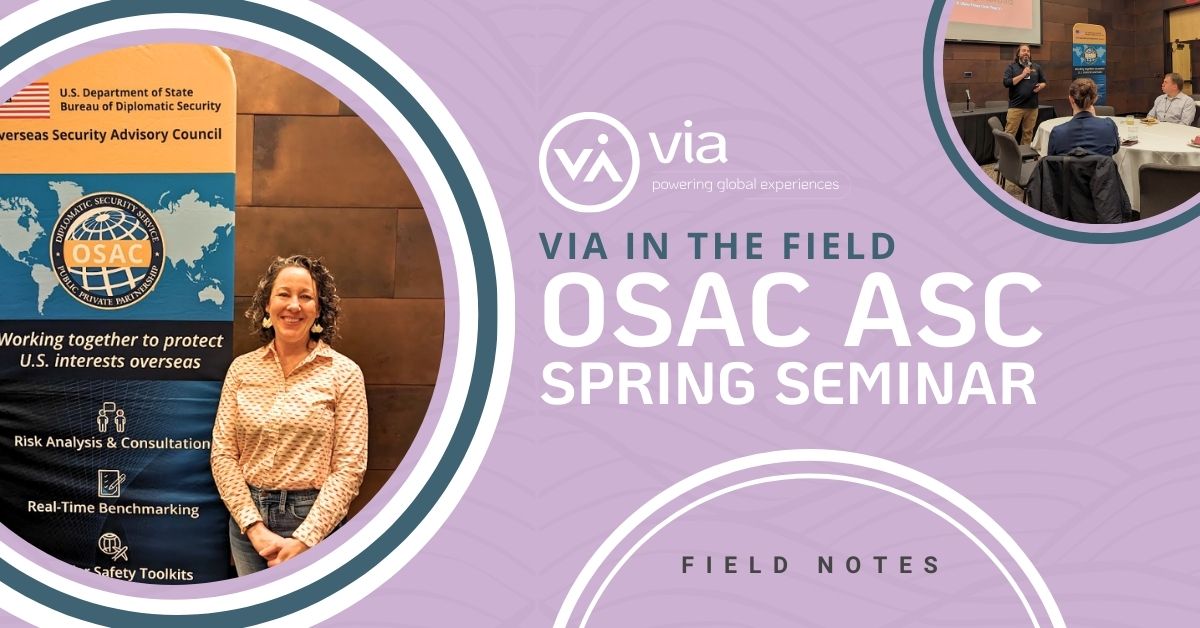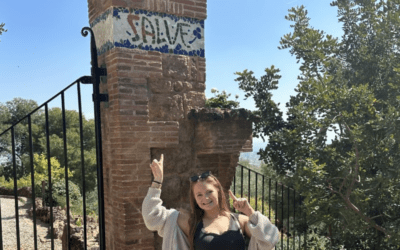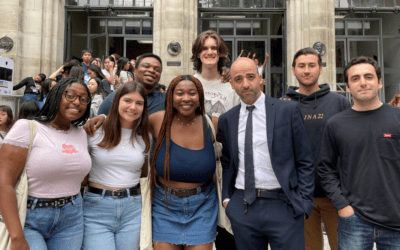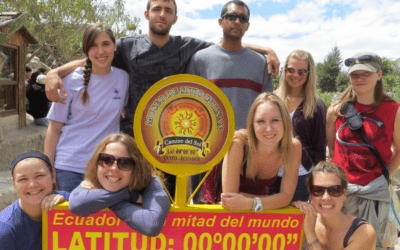One might think from the name that a meeting of the OSAC (Overseas Security Advisory Council) Academic Sector Committee would showcase a rigid bureaucracy, particularly given its connection with the U.S. Department of State. But the community of OSAC members are collegial and welcoming, eager to share best practices in handling the risks involved in study abroad and other university travel experiences. Hosted by Kevin Dostal Dauer and the team at the University of Minnesota in late April, this two day event showcased the power of collaboration and learning in action. Attendees delved into topics from mental health issues to infectious diseases around the world, and gained insights from U.S. State Department analysts on regions of the world that have been subject to recent crises. Andrea Dvorak, representing Via TRM, was on hand to share her insights and highlight the company’s commitment to embracing lessons learned.
The OSAC Community: Beyond Bureaucracy

OSAC is a public-private partnership between the U.S. Department of State’s Diplomatic Security Service (DSS) and security professionals from U.S. organizations. The Academic Sector Committee serves public and private higher education institutions, education abroad third-party providers, and other educational institutions. The group was established to enable its members to internally collaborate, network, and benchmark on safety, security, and health issues regarding education abroad. Members benefit from information sharing and networking in committee meetings like this one, as well as access to analysis and global support. Becoming a member and even attending the meetings are free, which is a big selling point, since so many professional development opportunities for higher education professionals can come with high conference fees.
Keynote Address: Insights from Dr. Michael Osterholm
The meetings’ keynote address was offered by Dr. Michael Osterholm. As Director for the Center for Infectious Disease Research and Policy (CIDRAP) at the University of Minnesota and a national expert on infectious diseases, his address was definitely a highlight for this group of risk managers. In answering questions from the audience, he provided critical perspective and his latest understanding of emerging issues like changes in the spread and severity of Dengue fever and the potential threat to humans of the current outbreaks of H5N1. Dr. Osterholm’s science based approach combined with the wisdom he’s gained over 50 years in the field offered a welcome perspective amidst the uncertainty inherent in our work.
Navigating Information and Prioritizing Mental Health Support for Students
Jillian Stampher, the head of news at Factal, spoke on the challenges in sourcing information for the platform and verifying it in real time. She spoke eloquently about the rapid dissemination of news and information from formal and informal sources, which can make it difficult to identify misinformation, particularly in crisis response scenarios. Successfully navigating information in today’s interconnected world, both for our travelers abroad but as well for our offices, is crucial for safeguarding the well-being of students and faculty abroad.
The importance of understanding and supporting students’ mental health was highlighted by the Assistant Director for Education Abroad Mental Health at the University of Minnesota, Laura Dupont-Jarrett. While many in our field start from a place of supporting students’ health symptoms, we must also address and manage problematic behaviors – and Dupont-Jarrett affirmed that that two pronged approach is the most effective way to ensure student success. It can be challenging to foster on campus collaboration in the face of limits to information sharing on campus – but this challenge only emphasizes the need for building and maintaining good working relationships to lean on when managing these issues.

Managing Risks in Education Abroad: Updates and Insights
A security update from State Department Regional Security Officers (RSOs) in Ecuador and a session on the pros and cons of university travel in China shed light on the challenges we have keeping abreast of political and social upheaval globally – and the diverse risk management strategies employed by universities and providers across the country as we support our travelers. Seasoned risk management professionals could use diverse responses to their advance, offering latitude as they tailor their responses. But newcomers in the risk management space might find that diversity overwhelming, potentially leading to decision-making paralysis.

Empowering the Education Abroad Community
The final day wrapped up with table conversations about case studies, which highlighted the need for wide collaboration during crises, both within universities and with external partners. Harnessing diverse expertise and perspectives by consulting with colleagues, international partners, insurance providers, our U.S. State department colleagues and other resources allows us to identify blind spots and mount effective responses to emerging incidents. Particularly in uncertainty, this approach can also reinforce our decision making and instill confidence.
In essence, the OSAC Academic Sector Committee meeting offered attendees new ideas and best practices to implement, a reminder of the resources OSAC makes available to its members, and a renewed sense of community with colleagues engaged in this work. Via TRM is dedicated to embracing these insights and continuing to support the education abroad and travel risk community in its mission to successfully manage the safety, security, and health of university travelers.




